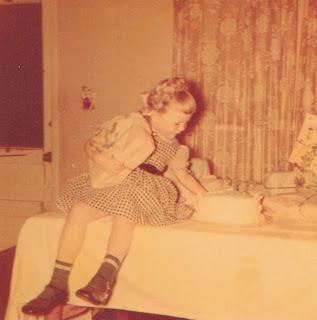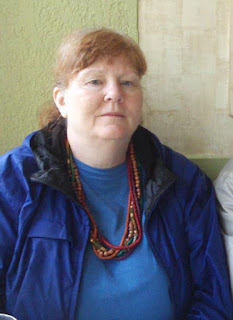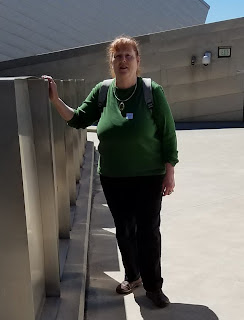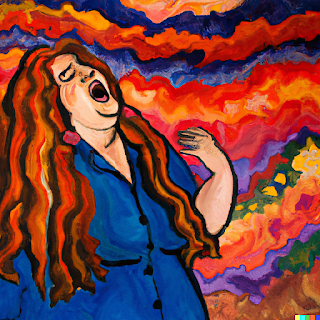Three Stevedores and Never-ending Funerals
 |
| Olive (Mo) and Harley (Dee Dee) Semple ______________________________________ |
WHEN I WAS 10, Mo, my grandmother, started
dragging me to viewings and funerals.
I
dreaded going, especially when I couldn’t figure out why I was there.
Like
knowing the corpse would have been helpful, but I rarely did. I was too young
to care about elderly dead people I didn’t know.
Did
she flip through the obits every day to troll for juicy prospects, ones that
would most likely serve a major spread afterwards?
The
truth is, she attended every funeral at St. Boniface, whether or not she knew
the deceased – I suppose she regarded every parishioner as family, no matter
personal connection.
And
then there was that peripheral connection – the cousin of an acquaintance was a
good enough excuse to mourn, even if the person was (gasp!) a Protestant.
She
once dragged me to a viewing of a grossly overweight man, dead at 40-something
from Diabetes complications.
“If
you don’t stop eating like three stevedores, that could be you,” Mo whispered, nodding to the casket, twice the
size of a normal one.
This
cautionary tale harbored in that casket was not enough to stop me from eating
like those mythical stevedores – once the service was over, I soldiered on at
the smorgasbord table, heaping my plate high.
While
I hated the funerals, my thoughts always turned to food, the expected repast for
bowing down before the dead: stranger, friend, or foe. We always did seem to
eat well, my reward for paying last respects. I still associate thin ham salad
sandwiches on square white bread, potato chips tasting like bacon grease, and
stale white cake with butter cream icing with the honored dead.
Then
there’s a special kind of coffee, brewed in giant urns, that is uniquely
funeral, offering up an aroma that wafts upward from the church basement to the
pews and wrapping itself around the mourners – a reminder and a beckoning back
to everyday life.
I
mention “foes” because even if Mo disliked the deceased, she would show up
anyway, just to view the body and cluck about its appearance:
“Oh,
she looks so good. Too bad she was so mean in life.”
“No
wonder she’s dead; I told her she needed to lose some weight. Now look at her.”
“Oooh,
she’s so thin. I wonder what diet she was on? I should try it.”
Hint: It’s called the “cancer
diet.”
Funerals
were bad enough, but the viewings were the worst. You had to kneel before the
body and say prayers to help speed the dearly departed’s soul to heaven.
Attention
all Catholic souls! Detour to Purgatory!
I
must’ve earned an eternity of Indulgences for hundreds of withered corpses I viewed
and honored, albeit unwillingly.
There
was no getting out of it.
After
my inevitable protests, Mo would shake her head and say, “If you don’t obey,
they’ll have to pay someone to attend your
funeral.”
I
would clench my fists and allow her to lead me away to the funeral home and the
church.
Once,
we went to the viewing of a baby who had died when his umbilical cord wrapped
around his neck, strangling him. As I kneeled before his small wicker coffin, I
couldn’t believe he was dead – he was beautiful, a perfectly formed cherub with
rosy cheeks, maybe just asleep – I reached out and touched his hand.
Still
and cold.
It
wasn’t the coldness that struck me so hard, but the absence of energy – the
lack of life force running through his veins.
I
jumped up and ran out of the funeral home, Mo running close behind me to drag
me back.
I remember nothing else about that viewing and funeral.
Getting
dragged to funerals continued throughout my early to mid-teens, and, then, one
day, I stood up to Mo and said I was no longer going to funerals of strangers.
Dee
Dee, my grandfather, backed me up.
I
was spared from then on.
Now
I realize she was at an age when her friends were beginning to drop dead. And,
while she had a few foes – mostly because she lacked a social filter – she also
had many friends who appreciated her forthrightness.
Perhaps
she didn’t want to face her own mortality alone.
Perhaps
the funeral ritual itself was a reminder that she was still alive and enjoyed good health, until one day she wouldn’t.
Mo
recruited cousin Bird, 10 years my junior, to take my place beside her.
As
far as I know, Bird accompanied her on her quest to pay respects to the dead
until the day Mo herself died.
Mo’s
death occurred in October 1987, shortly after the stock market crashed and
before the digital age took hold – almost to declare her freedom from a world that
was becoming too complicated for her sensibilities.
I
was with her when she died – as I rushed into her hospital room, she was taking
her last gasping breaths. I think she knew I was there, perhaps admonishing me
for my inebriation – I am ashamed to say that I was tipsy at the time, too
messed up to deal with her impending death without an alcohol filter.
At
her funeral, the pews were almost filled – not quite as much as when my
grandfather died 13 years earlier. Many of the people who had attended his
funeral were, themselves, gone.
I
looked around the church for any unfamiliar children offering up their
Indulgences for the withered woman in the casket.
I
saw none.
Part
of me still wishes I could have hired unwilling children, accompanied by their
hungry and curious grandmothers, to fill in pews – Mo deserved nothing less.
This funeral
held deep meaning for me, of course, but for others, life went on as usual.
Children
played in the street, young fathers and mothers worked, retired people went on cruises
– how could this happen when my Mo lay dead in her casket?
An
affront.
But
no matter how we feel, life goes on, and, eventually, so do we.
For
once, I cared nothing about the awaiting repast of ham salad sandwiches and
other funeral foods.
In
fact, I don’t even remember eating it.
I’m
sure a few relatives and friends – including children – heaped their plates high
and ate like three stevedores.
It’s
my family, after all.
From
her place in the hereafter, Mo most likely shook her head, wagged her finger, and
said, “tsk, tsk” –
Admonishing
mourners digging their own graves with a fork….
In
her honor.








Comments